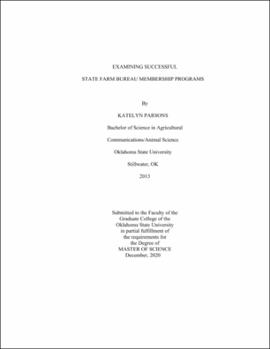| dc.contributor.advisor | Sitton, Shelly Peper | |
| dc.contributor.author | Parsons, Katelyn | |
| dc.date.accessioned | 2021-05-25T20:42:25Z | |
| dc.date.available | 2021-05-25T20:42:25Z | |
| dc.date.issued | 2020-12 | |
| dc.identifier.uri | https://hdl.handle.net/11244/329970 | |
| dc.description.abstract | Using a conceptual framework based on the uncertainty-identity theory, loyalty effect, identity fusion and sociometer model, I conducted a collective case study of five state Farm Bureau associations who were recognized for their membership programs by American Farm Bureau Federation with a Pinnacle Award for their efforts in 2019. The scope of this collective case study included Farm Bureaus in Arizona, Louisiana, Massachusetts, Texas, Utah, and Virginia. As I work for Massachusetts Farm Bureau Federation, that organization was excluded. None of the respondents were interviewed twice. | |
| dc.description.abstract | This qualitative study utilized collective case study interviews with state Farm Bureau staff to answer the following research questions: (1) What are key components of successful membership recruitment programs? (2) What are key components of successful membership retention programs? (3) How involved are Farm Bureau volunteer leaders in successful membership recruitment and retention programs? | |
| dc.description.abstract | Respondents' answers were reviewed and grouped into themes. From these themes I was able to determine member benefits, specifically insurance, was a key component of a successful membership recruitment and retention programs for the state Farm Bureaus interviewed. I concluded these findings refuted Hogg et al.'s (2008) uncertainty-identity theory as a key motivator to join Farm Bureau but supported Reichheld's (1996) loyalty effect as a key motivator to remain a Farm Bureau member. | |
| dc.description.abstract | Additional key components of a successful Farm bureau membership program included a Young Farmers and Ranchers committee; individual phone calls to farmer members to discuss concerns and offer assistance; and a welcome packet. I concluded these findings support Hogg et al.'s (2008) uncertainty-identity theory as a motivator for joining. Those individuals reduced uncertainty about themselves and their place in the world by being a Farm Bureau member. | |
| dc.description.abstract | I also determined that volunteer leader involvement with successful membership programs was limited. While a few of the Farm Bureaus indicated county leaders would call agricultural producers to renew their membership or potentially recruit a new member, they also indicated this pool of leaders was small. As such, I concluded these findings did not support or refute Swann et al.'s (2009) identity fusion model as a motivator for members to recruit other members. | |
| dc.format | application/pdf | |
| dc.language | en_US | |
| dc.rights | Copyright is held by the author who has granted the Oklahoma State University Library the non-exclusive right to share this material in its institutional repository. Contact Digital Library Services at lib-dls@okstate.edu or 405-744-9161 for the permission policy on the use, reproduction or distribution of this material. | |
| dc.title | Examining successful state Farm Bureau membership programs | |
| dc.contributor.committeeMember | Ramsey, Jon W. | |
| dc.contributor.committeeMember | Cartmell, D. Dwayne, II | |
| osu.filename | Parsons_okstate_0664M_17003.pdf | |
| osu.accesstype | Open Access | |
| dc.type.genre | Thesis | |
| dc.type.material | Text | |
| dc.subject.keywords | collective case study | |
| dc.subject.keywords | farm bureau | |
| dc.subject.keywords | membership | |
| dc.subject.keywords | non-profits | |
| dc.subject.keywords | recruitment | |
| dc.subject.keywords | retention | |
| thesis.degree.discipline | Agricultural Education | |
| thesis.degree.grantor | Oklahoma State University | |
